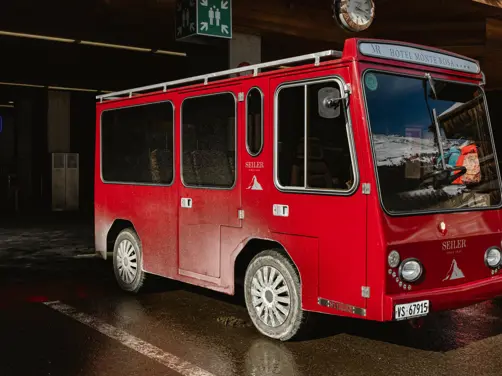On the Road
Zermatt watches on as the global automotive industry moves forward at pace with the shift towards e-mobility. After all, electric vehicles have been gracing the streets of this mountain village in the canton of Valais since the 1970s. They may not be quite as sleek and stylish as the ones being produced by the automotive giants right now, but they certainly aren’t any cheaper. And there’s a reason for that. Raphael Imboden is on hand to tell us more, with plenty of anecdotes, facts and figures up his sleeve. He produces electric vehicles for Zermatt at the family-run company Stimbo alongside his father Bruno Imboden.

´The Imboden family may produce electric vehicles now, but their business began with Raphael’s grandfather Heinrich transporting guests to hotels in carriages. Back in the 1950s, he was the only carriage driver. And the local mountain guides laughed in his face, convinced that his business venture was doomed to fail. And yet just a few years later, in 1960, he was providing taxi services with a fleet of some 40 carriages.´
´In the 1970s, the Imboden family was looking to the future and innovating once again. They bought two electric vehicles from a company called Pfander, convinced that they would be ideal for the narrow streets in the small village. The police had other ideas and confiscated them within a matter of days. Lengthy discussions and a period of heavily restricted use followed until the people of Zermatt finally had their say and voted in favour of the electric vehicles.´
´As you watch all the little electric vehicles zoom by on the roads in Zermatt, it’s hard not to notice that they all look pretty much the same. “The vehicles can only be up to 1.4 metres wide, 4 metres long and 2 metres tall,” explains Raphael Imboden. That amounts to a total volume of around 11 cubic metres. “That’s why the vehicles all look so rectangular. Everyone aims to hit those maximum dimensions spot on.” The only exception is vehicles used for work in the public interest.´
´If you’re assuming that the vehicles must come with a price tag to match their modest size, think again. Prices for production range between CHF 65,000 and CHF 120,000. A shuttle taxi for use by a hotel costs somewhere around CHF 90,000. The fact that each vehicle is manufactured as a one off drives up the costs. Stimbo’s margin isn’t even all that high. The company tends to make its money through vehicle maintenance. Maintenance that keeps the vehicles on the road for 30 to 40 years. Raphael Imboden puts the price into perspective: “The first vehicle we ever made is still going strong.”´
´The speed limit in Zermatt is 20 km/h and the vehicles can reach a maximum of 30 km/h. Private individuals are not permitted to drive electric vehicles on the roads here. Even businesses have to be able to prove that they need a vehicle for professional purposes. For example, a hotel may need to shuttle guests. The aim is to keep traffic to a minimum, whilst making sure local businesses have the electric vehicles they need. Around 550 of them are registered in Zermatt in total.´






